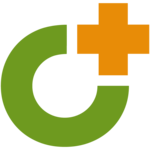Best Electronic Health Record (EHR) Software
List of best Electronic health record software solutions are Halemind, NextGen, Kareo, MicroMD EMR, Cerner, CareCloud, Allscripts, and Nextech. These EHR software streamline operations to save time and enhance efficiency.



No Cost Personal Advisor
List of 20 Best Electronic Health Record (EHR) Software
Contenders | 2024
Software by The athenahealth, Inc
Athenahealth is a cloud-based electronic patient record system designed to streamline clinical workflows and improve patient care. The software offers a wide range of features to support clinical documentation, billing, and revenue cycle management. Another key feature of Athenahealth EHR software is its interoperability functionalities. The software is designed to integrate with other healthcare systems and providers, allowing for seamless data exchange and coordination of care. Read athenahealth Reviews
Explore various athenahealth features, compare the pricing plans, and unlock the potential of seamless operations by selecting the right software for your business.
Features
View all athenahealth Features- Practice Management
- Appointment Scheduling
- Patient Appointments
- Physician Management
- Scheduling
- Document Management
- Case Management
- Insurance Verification
Pricing
athenahealth Caters to
- StartUps
- SMBs
- Agencies
- Enterprises
Contenders | 2024
Software by NextGen Healthcare
NextGen Healthcare is one of the top EHR systems, which is feature-rich and adaptable, created for medical practices of all sizes, including those in primary care, specialty care, and mental health. A patient portal is another feature of the software that enables patients to access their medical records securely, get in touch with their doctors, and make appointment requests. Read NextGen Reviews
Explore various NextGen features, compare the pricing plans, and unlock the potential of seamless operations by selecting the right software for your business.
Features
View all NextGen Features- Claims Management
- Patient Billing
- Patient Registration
- Patient Records
- Patient Scheduling
- Physician Scheduling
- EMR / EHR
- Patient Portal
NextGen Caters to
- StartUps
- SMBs
- Agencies
- Enterprises
Emergents | 2024
Software by SimplePractice, LLC
SimplePractice is a web-based Electronic Health Record (EHR) software designed for mental health practitioners, such as therapists, counselors, and social workers. It provides an easy-to-use platform for managing patient information, scheduling appointments, and billing. The software includes features such as customizable intake forms, progress notes, treatment plans, and client portals for secure messaging and file sharing. Read SimplePractice Reviews
Explore various SimplePractice features, compare the pricing plans, and unlock the potential of seamless operations by selecting the right software for your business.
Features
View all SimplePractice Features- Self Service Portal
- Recurring Appointments
- Multi-Provider Practice
- Dunning Management
- Claims Management
- Multi-Location
- Employee Management
- Compliance Tracking
Pricing
SimplePractice Caters to
- StartUps
- SMBs
- Agencies
- Enterprises
Contenders | 2024
Software by AdvancedMD, Inc
AdvancedMD is the best EHR software designed for healthcare providers, including physicians, medical practices, and medical billing companies. It offers a plethora of features that assist in patient care, from scheduling and billing to clinical documentation and revenue management. The software includes customizable templates for clinical notes, orders, and referrals, making it easy to document patient encounters efficiently. Read AdvancedMD Reviews
Explore various AdvancedMD features, compare the pricing plans, and unlock the potential of seamless operations by selecting the right software for your business.
Features
View all AdvancedMD Features- Patient Record Management
- Document Management
- Patient Diagnosis
- Patient Eligibility Checks
- Billing Estimates
- E-Prescribing
- Electronic Prescribing
- IVR / Voice Recognition
Pricing
AdvancedMD Caters to
- StartUps
- SMBs
- Agencies
- Enterprises
Software by drchrono Inc
Integrated with powerful features, i.e., patient check-ins, doctor's schedule, patients' personal record, automatic register next appointment, IPD, OPD, e-Prescription, medical billing, and more with software as well as application. All the features can customize. Facilities to send the electronic prescription, X-rays, reports, and also other files via iPad, iPhone, and attach with patients' personal records. Learn more about drchrono EHR
Explore various drchrono EHR features, compare the pricing plans, and unlock the potential of seamless operations by selecting the right software for your business.
Features
View all drchrono EHR Features- E/M Coding
- Waiting Time Tracking
- Handwriting Recognition
- Patient Portal
- Appointment Management
- E-Prescribing
- ONC-ATCB Certified
- Charting
Pricing
drchrono EHR Caters to
- StartUps
- SMBs
- Agencies
- Enterprises
Emergents | 2024
Software by CareCloud
One of the best EHR systems, CareCloud, assists healthcare practitioners in enhancing patient care, raising productivity, and cutting expenses. With the help of this user-friendly software, healthcare professionals can collect patient data in a systematic way, guaranteeing that patient records are correct and current. The billing and revenue cycle management solutions in CareCloud's EHR software assist practices in leveling-up revenue and streamlining their operations. Read CareCloud Reviews
Explore various CareCloud features, compare the pricing plans, and unlock the potential of seamless operations by selecting the right software for your business.
Features
View all CareCloud Features- Email Management
- Claims Management
- Patient History Management
- Patient Medication
- HIPAA Compliant
- EMR / EHR
- Reporting
- Appointment Management
Pricing
CareCloud Caters to
- StartUps
- SMBs
- Agencies
- Enterprises
Emergents | 2024
Software by Modernizing Medicine
Modmed, a top EHR software, is a complete solution offered to healthcare professionals for managing patient care and billing. It is a fantastic fit for practices of all sizes because of its flexibility and scalability. Patients can securely view their medical records, make appointment requests, and connect with their healthcare professionals through the patient portal provided by Modmed. Learn more about Modmed
Explore various Modmed features, compare the pricing plans, and unlock the potential of seamless operations by selecting the right software for your business.
Features
View all Modmed Features- Patient Scheduling
- Multi-Office
- Inventory Management
- Compliance Tracking
- Claims Management
- Appointment Management
- Handwriting Recognition
- Physician Scheduling
Modmed Caters to
- StartUps
- SMBs
- Agencies
- Enterprises
Emergents | 2024
Software by WebPT
WebPT is one of the electronic health record tools designed specifically for physical therapy practices. It provides a suite of tools and features that streamline the documentation, billing, and administrative tasks associated with managing patient care. The software also includes built-in clinical decision support tools and customizable goal setting, so therapists can track progress and adjust treatment plans as needed. Read WebPT Reviews
Explore various WebPT features, compare the pricing plans, and unlock the potential of seamless operations by selecting the right software for your business.
Features
View all WebPT Features- Patient Scheduling
- Appointment Scheduling
- Self Service Portal
- Progress Tracking
- Billing & Invoicing
- Patient Registration
- Patient Records
- Exercise Management
WebPT Caters to
- StartUps
- SMBs
- Agencies
- Enterprises
Emergents | 2024
Software by Cerner Corporation PTY Limited
Cerner is a leading provider of the top (EHR) software preferred by healthcare organizations around the world. The company offers a range of EHR solutions that are designed to meet the needs of different types of healthcare providers, from small clinics to large hospitals and health systems. Cerner's EHR software also includes robust reporting and analytics tools that provide healthcare providers with real-time data on key performance metrics. Learn more about Cerner
Explore various Cerner features, compare the pricing plans, and unlock the potential of seamless operations by selecting the right software for your business.
Features
View all Cerner Features- Patient History Management
- Document Management
- Electronic Prescribing
- Patient Appointments
- Dashboard
- Billing & Payment Management
- ONC-ATCB Certified
- E-Prescribing
Pricing
Basic
$ 25
User/Month
Cerner Caters to
- StartUps
- SMBs
- Agencies
- Enterprises
Emergents | 2024
Software by TherapyNotes
TherapyNotes.com is an electronic health record (EHR) software designed specifically for mental health professionals. The software provides a suite of tools and features that streamline the documentation, billing, and administrative tasks associated with managing patient care. The software includes built-in clinical decision support tools and customizable goal setting, so therapists can track progress and adjust treatment plans as needed. Learn more about TherapyNotes
Explore various TherapyNotes features, compare the pricing plans, and unlock the potential of seamless operations by selecting the right software for your business.
Features
View all TherapyNotes Features- Medical Billing
- Initial Assessments
- Single Provider Practice
- Case Management
- Employee Management
- Invoice history
- Forms Management
- Practice Management
TherapyNotes Caters to
- StartUps
- SMBs
- Agencies
- Enterprises
Emergents | 2024
Software by Allscripts
Allscripts is the leading supplier of electronic health record (EHR) software for healthcare businesses. Integration with various healthcare IT systems, including imaging systems, lab systems, and billing systems, is one of the primary characteristics of Allscripts' EHR software. The EHR software from Allscripts is a complete solution that may assist healthcare professionals in enhancing patient care, boosting productivity, and lowering costs. Learn more about Allscripts
Explore various Allscripts features, compare the pricing plans, and unlock the potential of seamless operations by selecting the right software for your business.
Allscripts Caters to
- StartUps
- SMBs
- Agencies
- Enterprises
Emergents | 2024
Software by eClinicalWorks Pvt Ltd
The electronic health record (EHR) software, eClinicalWorks, is cloud-based and made to help all sizes of medical offices run more efficiently. The software offers a plethora of advanced functionalities that simplify decision-making, revenue management, patient interaction, and documentation. Advanced decision support technologies from eClinicalWorks are also available to assist medical professionals in effectively treating patients. Learn more about eClinicalWorks
Explore various eClinicalWorks features, compare the pricing plans, and unlock the potential of seamless operations by selecting the right software for your business.
Features
View all eClinicalWorks Features- ONC-ATCB Certified
- Voice Recognition
- E/M Coding
- Reporting
- Charting
- E-Prescribing
- HIPAA Compliant
- Centralise Patient Information
Pricing
EHR Only
$ 449
Per Month
EHR with Practice Management
$ 599
Per Month
eClinicalWorks Caters to
- StartUps
- SMBs
- Agencies
- Enterprises
Emergents | 2024
Software by Kareo Inc.
Kareo is one of the top EHR systems designed to help healthcare providers manage patient care, billing, and administrative tasks more efficiently. The software is tailored to the needs of small to medium-sized healthcare practices and provides a range of features to support clinical workflows and improve patient outcomes. Kareo's EHR software includes billing and revenue cycle management tools to help practices streamline their operations and maximize revenue. Read Kareo Reviews
Explore various Kareo features, compare the pricing plans, and unlock the potential of seamless operations by selecting the right software for your business.
Features
View all Kareo Features- HIPAA Compliant
- Patient Billing
- Patient Scheduling
- Patient Records
- Patient Registration
- E-Prescribing
- Claims Management
- Insurance Eligibility Verification
Pricing
Kareo Clinical
$ 75
User/Month
Kareo Caters to
- StartUps
- SMBs
- Agencies
- Enterprises
Contenders | 2024
More Time Caring. Less Time Charting.
KareXpert is a cloud-based electronic health record (EHR) software designed to help healthcare providers manage patient data and improve patient care. KareXpert also offers supportive clinical decision tools that assist healthcare providers in diagnosing and treating patients more accurately. These tools come with automated reminders for tests and preventive care, patient-specific medication lists, and alerts for possible drug interactions. Read KareXpert Cloud based EMR/EHR Reviews
Explore various KareXpert Cloud based EMR/EHR features, compare the pricing plans, and unlock the potential of seamless operations by selecting the right software for your business.
- Real Time Reporting
- Electronic Prior Authorization
- Geriatric Care
- Patient Portal
- Treatment Plans
- Retention Management
- Sample Tracking
- On Call Scheduling
KareXpert Cloud based EMR/EHR Caters to
- StartUps
- SMBs
- Agencies
- Enterprises
Contenders | 2024
Software by EHR YOUR WAY
EHR YOUR WAY is the best electronic health record software developed to provide healthcare providers with customizable EHR solutions. The software is designed to meet the unique needs of each healthcare provider, from small clinics to large hospitals and health systems. The robust functionalities of this EHR software make it the most preferred EHR solution by healthcare professionals. Read EHR YOUR WAY Reviews
Explore various EHR YOUR WAY features, compare the pricing plans, and unlock the potential of seamless operations by selecting the right software for your business.
Features
View all EHR YOUR WAY Features- Activity Tracking
- Candidate Identification
- Calendar Management
- Patient Records
- Self Service Portal
- Case List Management
- Appointment Reminders
- Compliance Tracking
EHR YOUR WAY Caters to
- StartUps
- SMBs
- Agencies
- Enterprises
Contenders | 2024
Connected EMR and Hospital Management System
Halemind is an electronic health record (EHR) software designed to streamline healthcare operations and improve patient outcomes. The software is designed to be user-friendly, efficient, and scalable to cater to healthcare facilities of varying sizes and complexities. The prescription management feature allows healthcare professionals to create, manage and send prescriptions electronically. Read Halemind Reviews
Explore various Halemind features, compare the pricing plans, and unlock the potential of seamless operations by selecting the right software for your business.
Features
View all Halemind Features- In-Patient Management
- Patient Diagnosis
- Electronic Data Capture
- Historical Reporting
- Billing & Invoicing
- Prescription Cancellation
- Physician Management
- Patient Records Management
Pricing
Starter
$ 104
Per Year
Standard
$ 278
Per Year
Premium
$ 555
Per Year
Halemind Caters to
- StartUps
- SMBs
- Agencies
- Enterprises
Emergents | 2024
Software by Practice Fusion
Practice Fusion is one of the most recommended electronic health record tools that help professionals create improved practices. The program includes a range of functions to support clinical processes, billing and revenue cycle management, and patient interaction. The program enables medical professionals to gather patient information in an organized way, guaranteeing that patient records are accurate and current. Read Practice Fusion Reviews
Explore various Practice Fusion features, compare the pricing plans, and unlock the potential of seamless operations by selecting the right software for your business.
Features
View all Practice Fusion Features- Claims Management
- Patient Appointments
- Patient Diagnosis
- Patient History Management
- Client Management
- Patient Records
- E-Prescribing
- HIPAA Compliant
Pricing
Basic
$ 99
User/Month
Practice Fusion Caters to
- StartUps
- SMBs
- Agencies
- Enterprises
Emergents | 2024
Software by DocNetwork.org
CampDoc.com is a cloud-based electronic health record (EHR) software designed to help camps and other recreational programs manage their health services more efficiently. The software offers a range of features to support health management, including health history tracking, medication management, and incident tracking. The software allows healthcare providers to capture detailed incident reports, including photos and notes, ensuring that all necessary information is recorded accurately and efficiently. Learn more about CampDoc.com
Explore various CampDoc.com features, compare the pricing plans, and unlock the potential of seamless operations by selecting the right software for your business.
Features
View all CampDoc.com Features- Scheduling
- Program Management
- Billing & Invoicing
- Staff Management
- Registration Management
- Parent Portal
- Check-in / Check-out
- Online Registration
Pricing
CampDoc.com
$ 4
user/year
CampDoc.com Caters to
- StartUps
- SMBs
- Agencies
- Enterprises
Emergents | 2024
Software by Nextech Systems, LLC
Nextech is a top EHR software developed especially for healthcare providers and helps in managing their practices more efficiently. The software has robust features to support clinical workflows, billing and revenue cycle management, and patient engagement. The software is designed to meet the needs of different types of healthcare providers and is an excellent choice for those looking for a customizable and interoperable EHR solution. Learn more about Nextech
Explore various Nextech features, compare the pricing plans, and unlock the potential of seamless operations by selecting the right software for your business.
Features
View all Nextech Features- E-Prescribing
- Insurance Eligibility Verification
- Patient Portal
- HIPAA Compliant
- Patient Records
- Patient Registration
- Patient Scheduling
- EMR / EHR
Nextech Caters to
- StartUps
- SMBs
- Agencies
- Enterprises
Emergents | 2024
Software by The athenahealth, Inc
athenaClinicals is a fully functional electronic health record (EHR) program that aids healthcare practitioners in enhancing patient care, boosting productivity, and cutting costs. Healthcare providers can communicate data in a standardized and secure manner thanks to the software's compatibility with a number of interoperability standards, including HL7, FHIR, and CCDA. Learn more about athenaClinicals
Explore various athenaClinicals features, compare the pricing plans, and unlock the potential of seamless operations by selecting the right software for your business.
Features
View all athenaClinicals Features- Appointment Scheduling
- Code Processing
- Admissions Management
- Self Service Portal
- Billing & Invoicing
- SMS Messaging
- Accounting Integration
- Charge Capture
athenaClinicals Caters to
- StartUps
- SMBs
- Agencies
- Enterprises
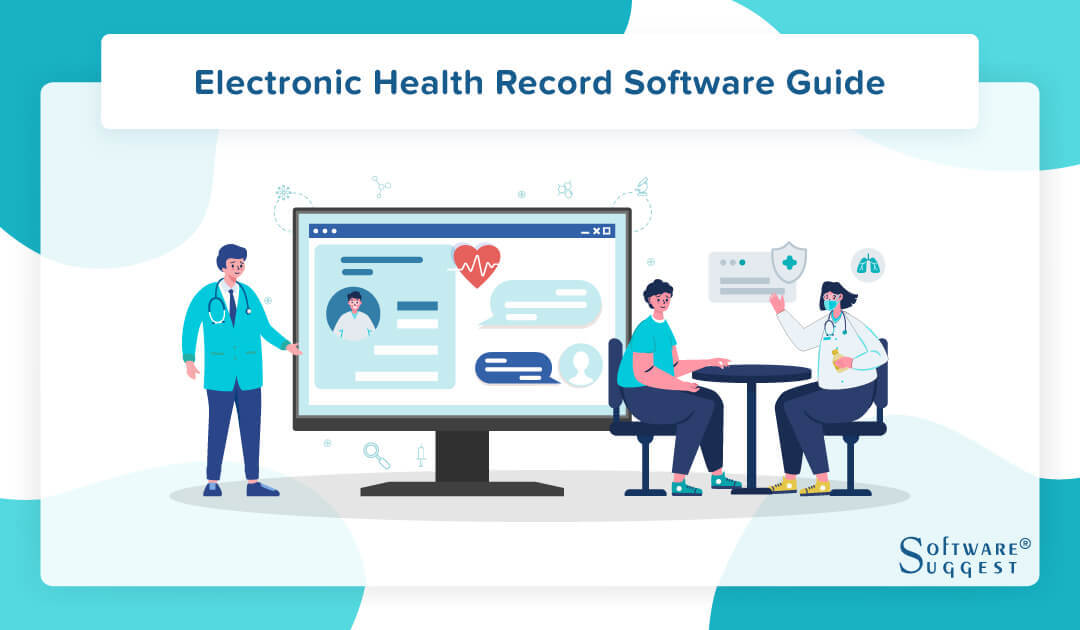
What is EHR Software?
Electronic health record software will store all medical records, insurance, claims, vendor details, doctor prescriptions, patient details, etc.
The healthcare industry now relies heavily on electronic health records. Doctors and nurses no longer use paper and pens to record individual patients' vitals. The tech transformation played a significant role in increasing hospital acknowledgment of EHRs and their benefits.
EHR software comes in various forms, all of which aim to enhance the process of storing and exchanging medical data. Various electronic health records software allows doctors to track vital data in emergencies and access checkup details for individual patients. Also, it tracks vitals like blood pressure and sugar levels over time.
Because this contains medical records in a single computer system, it improves workflow and accessibility. This new tech is a new gold standard for organizations looking to increase the effectiveness and productivity of their institutions not only clinically but also economically.
It is critical to select the best EHR solution for your clinic. Whereas the right product will assist physicians in delivering better care by streamlining processes, the improper one will disrupt your services.
Who Uses Electronic Health Record Software?
Several healthcare professionals and institutes use electronic health record software to handle patient information digitally. Here are a few examples of EHR software users:
-
Healthcare Providers
EHR software is generally used by physicians, nurses, and other healthcare associates. It is used to manage patient information like medical histories, diagnoses, treatments, and medication records. Thus it leads to improved care for patients and lowers the risk of errors.
-
Hospitals and Clinics
EHR software is utilized in hospitals and clinics to handle patient appointments, records, and billing. Electronic patient record system also assists healthcare organizations in meeting regulatory mandates such as HIPAA.
-
Insurance Companies
EHR software is used by insurance companies to manage claims, process payments, and evaluate medical records to ensure the treatment meets policy standards.
-
Public Health Agencies
Public health agencies use EHR software to track and monitor disease outbreaks, manage immunization records, and collect population health data.
-
Researchers
EHR software allows researchers to analyze and present patient data for clinical trials and other research studies. It assists researchers in identifying potential study participants and tracking their advancement throughout the study.
EHR software is vital for healthcare providers and organizations to handle patient information, improve care quality, and meet regulatory requirements.
What are the Types Of EHR Software?
EHR software is becoming popular worldwide in the healthcare industry because it simplifies processes and enhances the level of treatment provided to patients. Each type of EHR software has its own set of features and advantages, as well as potential disadvantages.
-
Cloud-based EHR Software
Cloud-based medical practice software is stored on remote servers and is accessible via the internet. This software is best for practices looking to cut IT infrastructure and maintenance costs. Cloud-based EHR systems are scalable and adaptable, allowing practices to add and remove users, features, and services as needed.
Another benefit of cloud-based electronic health record tools is that they are usually automatically updated, ensuring the system is always up-to-date and secure. Cloud-based EHR systems are also available from anywhere with internet access, allowing doctors to access patient information at home or on the road.
Yet, there are potential challenges to using cloud-based EHR systems, such as security concerns and the potential for downtime if the internet connection is lost.
-
Physician-hosted Systems
Physician-hosted EHR emr software is installed and maintained on the practice's own servers. This system provides complete control over the software, which is beneficial for practices with unique requirements or preferences.
Physician-hosted systems can be tailored to the practice's needs, resulting in improved productivity and efficiency. Again, physician-hosted systems are more secure than cloud-based systems.
It is due to complete control over the security of the data. Yet, physician-hosted software requires vital IT infrastructure and maintenance. It can be very costly and time-consuming.
-
Remotely-Hosted Systems
These systems are basically third-party servers that doctors and healthcare providers can access through a secure connection. So what makes these systems different from cloud-based EHR systems?
The one main difference for remotely-hosted systems is that a third-party vendor manages the servers, although, for cloud-based systems, the servers are managed by the EHR vendor.
One benefit of using a remotely hosted system is that it can be less expensive for practices because the vendor manages the IT infrastructure and maintenance. These systems are also very flexible and scalable, allowing practices to add and remove users and features easily.
But even so, remember that remotely-hosted systems may provide a different level of customization than physician-hosted systems. Additionally, privacy and data security issues may arise when using third-party servers.
Remotely-hosted EHR systems might be an excellent choice for many practices. But weighing the pros and cons and making an informed decision based on your specific needs and concerns is critical.
What are the Benefits of EHR Software?
By replacing traditional paper-based methods, EHR software has transformed the way healthcare professionals store, manage, and share patient data. In this section, we'll see some of the perks of medical practice software and how it's positively impacting the healthcare industry.
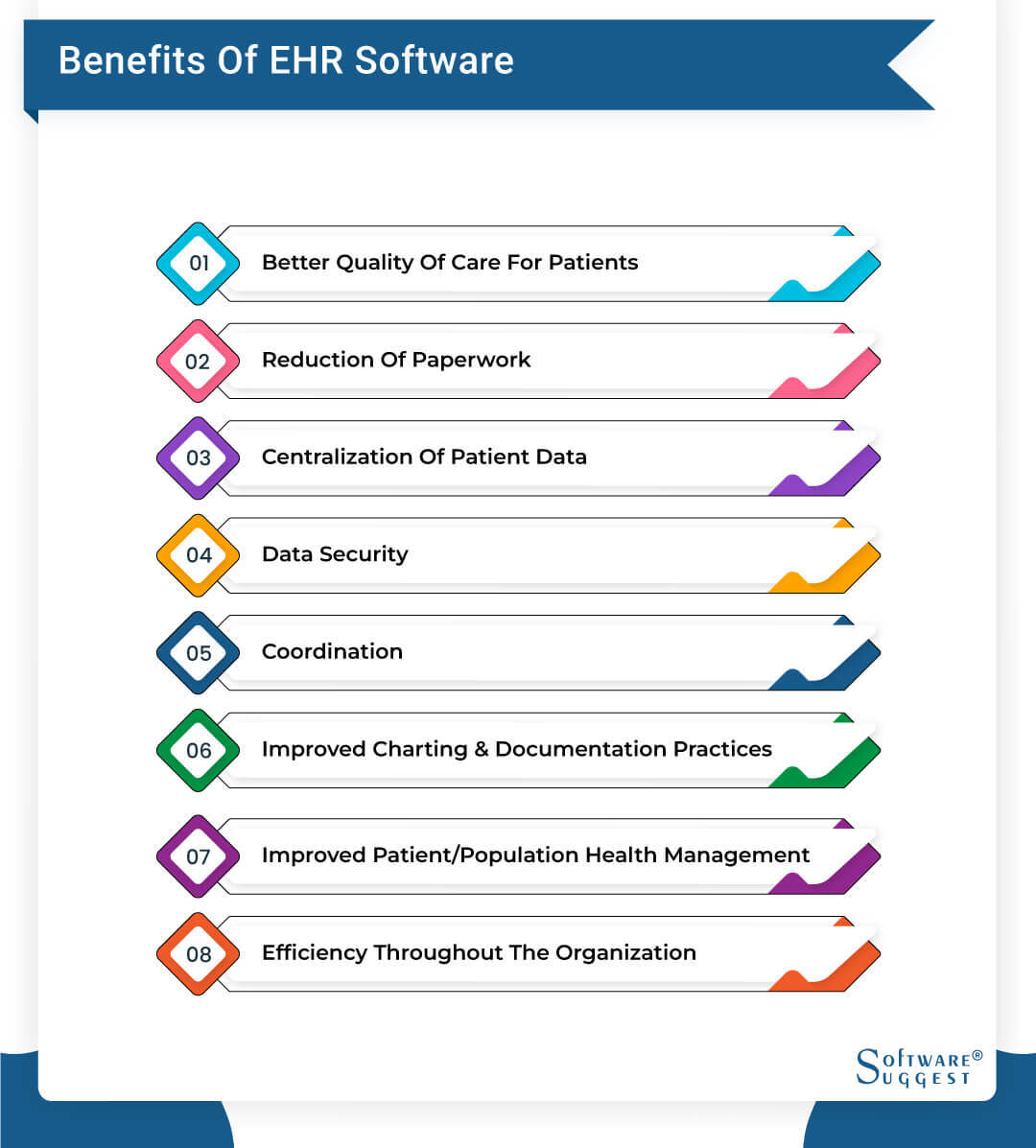
-
Better quality of care for patients
The perk of using such software is security. Once healthcare professionals have access to it, things get in line. For example, medical history, including previous diagnoses, allergies, and medication lists, are all managed in a single solution. Also, after gathering information, it gives an enhanced report for better decision-making purposes.
-
Reduction of paperwork
Paperwork is very redundant and prone to errors. With the advent of such EHR software, healthcare professionals can do their back-end and front-desk tasks very easily. With medical practice software, such professionals can quickly and accurately record patient data. Hence, eliminating the requirement for paper-based systems.
-
Centralization of patient data
Centralization of patient data is another perk of electronic medical records software. Healthcare providers can easily access patient data with all patient data stored in a centralized location. No matter where they are located, working is smooth. This helps improve patient care by providing accurate and up-to-date information to healthcare providers when needed.
-
Data security
This software has a very tight security system. It is required when patients consult with several doctors. Here, the chances of misplacing paper documents are high. All healthcare professionals will have full rights to the same patient data thanks to EHR software, which will improve care coordination and patient outcomes.
-
Coordination
One significant advantage is improved care coordination. EHR software enables primary care physicians and specialists, among others, to easily access and share patient information. This reduces errors and ultimately leads to better patient outcomes by avoiding duplication of tests and treatments.
-
Improved charting and documentation practices
Another advantage of electronic medical records software is improved charting and documentation practices. Healthcare professionals can use EHR systems to quickly and easily document patients' medical histories. For example, diagnoses, treatment plans, and progress notes. This information is then easily accessible to other healthcare providers, improving care continuity.
-
Improved patient/population health management
By using EHR software, patient health can be improved. All the input that has been fed into the system provides systematic data representation. Charts, diagrams, and patterns are given to show the patient's history and current response to the treatment.
-
Efficiency throughout the organization
Finally, EHR software increases organizational efficiency. It enables rapid and simple access to patient data for healthcare professionals. All the redundant and time-consuming tasks are reduced, and efficiency is improved. It results in more efficient time management, allowing healthcare providers to concentrate on patient care.
What are the Features Of Electronic Health Record Software?
This software is basically designed to simplify healthcare processes, improve patient outcomes, and enhance clinical workflows. In this part, we will take a closer look at the key features of Electronic Health Record software. Read on to know more:-
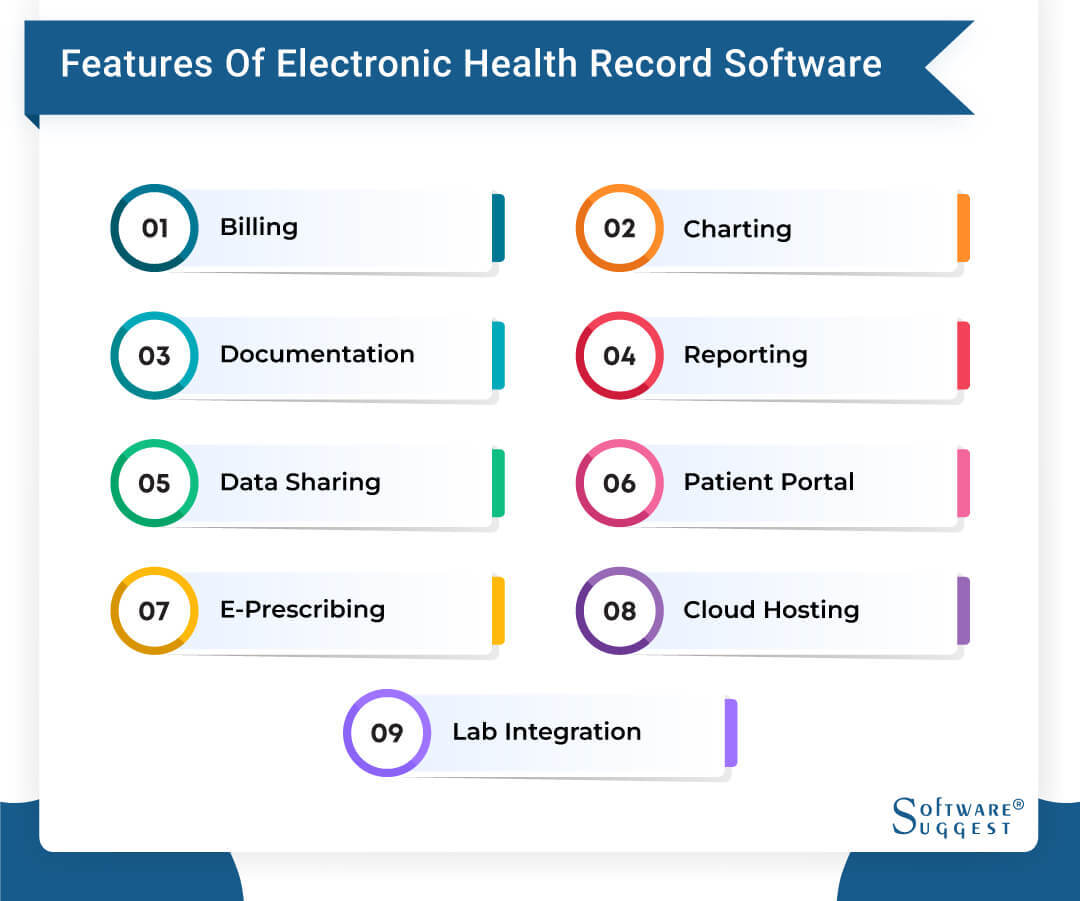
One of the main features of EHR software is its billing module. It eases the billing process by automatically generating invoices, tracking the payment of patients, and managing claims. The billing module ensures that healthcare professionals receive timely payments and helps reduce billing errors.
-
Charting
Another crucial feature of electronic medical records software is charting. It enables healthcare providers to record patients' medical histories in real-time. For example, vital signs, medications, allergies, and medical history. The charting module allows doctors and nurses to access and update patient data easily. Ultimately, it improves the quality of care and reduces errors.
-
Documentation
By merely inserting patient information into medical records, electronic medical records software accelerates documentation. It alleviates the burden of manual documentation, allowing healthcare providers to concentrate on care provision. Doctors and nurses may quickly and easily access patient data thanks to the patient portal. Hence, saving time and improving care quality.
-
Reporting
Another perk of this EHR software is the report generation ability. The process is automatic and gives a lot of different templates depending on the need. The report generation is so smart that the team's performance can be tracked in patient portals. Hence, by reviewing these reports, the team can learn by looking at the low points to improve things for their patients.
-
Data Sharing
Healthcare professionals may easily and securely share patient data due to EHR software. This feature improves patient outcomes, streamlines testing and processes, and enhances care coordination. The data-sharing module also makes patient data accessible to healthcare professionals via the patient portal at any time and location, enhancing patient care and outcomes.
Patients may access their medical records, make appointments, and connect with healthcare practitioners using the patient portal with The program. The patient portal promotes provider-patient communication, encourages patient participation in their care, and increases patient engagement.
-
E-Prescribing
By enabling healthcare professionals to deliver prescriptions to pharmacies electronically, EHR software streamlines the prescription process. This function optimizes patient safety, enhances drug management, and decreases errors.
EHR software can be hosted in the patient portal, which has a number of perks, including accessibility, scalability, and affordability. Thanks to cloud hosting, healthcare professionals will always have access to patient data, which also eliminates the need for pricey hardware and software.
-
Lab Integration
Lab test results are more accurate and quick, thanks to EHR software's seamless interaction with lab systems. In order to enhance patient care and outcomes, the lab integration module ensures that healthcare professionals have access to real-time lab data.
How to Choose the Right EHR Software?
Even though the advantages of an effective EHR system are obvious, establishing and adjusting to one can be difficult. Think about your priorities before committing to a certain EHR system.
EHR systems have an impact on every aspect of the practice, not only on physicians. This is particularly true if the technology works with revenue cycle management or a practice management system.
The practice should ensure everyone is aware of the long-term plan and implementation objectives. Before making a choice, weigh your choices. Read below the factors to consider:-
-
Cost
The cost of an EHR system is determined by the features you select, the vendor you choose, and the number of practitioners in your practice. Find out the price of each new part and the initial license or activation fees when requesting an estimate.
The cost is often calculated by multiplying the practitioners using the software by a monthly subscription charge for smaller practices. With activation or license fees, the monthly subscription prices for EHR companies choices range from $150 to $1,100, depending on the company.
The cost of those fees could range from 100$ to several thousand dollars. The cost will be chosen in consultation with the seller and will vary depending on the specifics of each practice.
-
Ease of use
If the software isn't user-friendly, it might deter workflow while your team tries to complete repetitive activities. Use these opportunities to determine whether a system would be advantageous or detrimental to your practice. You can do this by taking advantage of the free trials or live demonstrations that the majority of suppliers provide to prospective customers.
Since you'll be using the system every day, you should pick one that won't take you apart from your patients or increase your workload by hours. The patient records system must be simple to use for office workers and billing management in addition to the provider.
-
Implementation and training
It's crucial to analyze your vendor's strategy for getting your system up and running. Implementing an EHR system may take a few weeks to a few months.
Also, some suppliers provide staff and doctor training to guarantee everyone in your office is familiar with the new software. Sometimes, after the system is put into use, a vendor should provide one-on-one support without charging extra for a set period of time.
-
Integration
E-prescribing and ordering laboratory tests and reports electronically are two helpful capabilities of EHRs. Nevertheless, not every lab, hospital, or pharmacy will be set up to work with every EHR system correctly.
You should ask suppliers which interfaces they use and whether they are compatible with the nearby facilities in your area to ensure connectivity. It is actually a key goal of the government's Meaningful Use Stage III requirements.
Try to ask the merchant whether that is feasible and if it would be covered by your membership fees. Several providers are prepared to build out new integrations upon request.
-
Customer service
Making the transition to a new EHR system is not easy. So make sure the company should help you along the way. The service should be swift, so you don't have to spend too much time figuring out your new system afterward.
It won't be useful if it's difficult to contact or if you are not very willing to answer queries before you buy. An easy transition to a new EHR system depends on you and the vendor you select having a healthy working relationship.
-
ONC EHR certification
Medical software regulations are always changing, but a system must adhere to the fundamental standards established by the CMS.
These certifications are also very important for receiving Medicare and Medicaid reimbursements and determining. Be it a practice that qualifies for incentive payments or is at risk of fines because it uses medical software.
Top 5 Electronic Health Record Software
|
Name
|
Free Trial
|
Demo
|
Pricing
|
|---|---|---|---|
| No |
No |
Based on Individual Quotes | |
|
No |
Yes | Based on Individual Quotes | |
|
No |
Yes |
Based on Individual Quotes | |
| No |
Yes |
Custom Pricing | |
|
No |
Yes |
On-Request |
Medical professionals are better able to help patients when they use an EHR because they have a complete grasp of the patient's health. EHR systems can be helpful with a variety of applications, including practice management, billing, and medical scheduling. Let's take a look at the best EHR software:-
Epic is a software company. Their software is made for both big hospitals and small healthcare facilities. The EpicCare EHR solution is approved by many established organizations. Additionally, these top EHR systems enable mobile and tablet capabilities and support telemedicine features, which enable doctors and patients to communicate via a video platform.

Features
- Multiple medical provider access
- Advanced reporting
- Patient workflow management
- Workflow coordination
- Integration with billing software
Pros
- Patient charts are easily accessible and tracked
- Simple to use
- Charting quickly and with minimum effort
- Results from the lab with normal levels are excellent
Cons
- The database is not properly organized like other software
- One may find the name of rows and columns of the table not similar to general software
Pricing
It is based on individual quotes.
Using Kareo makes running a lone medical practice easier and more satisfying. Kareo Practice Management streamlines your workflow, from the front desk to the back-end billing. More than 75,000 healthcare professionals trust it for their small offices since it is simple to use and has been shown to be effective. You can run a smarter business, communicate with patients, provide better care, and get paid more promptly for their platform.
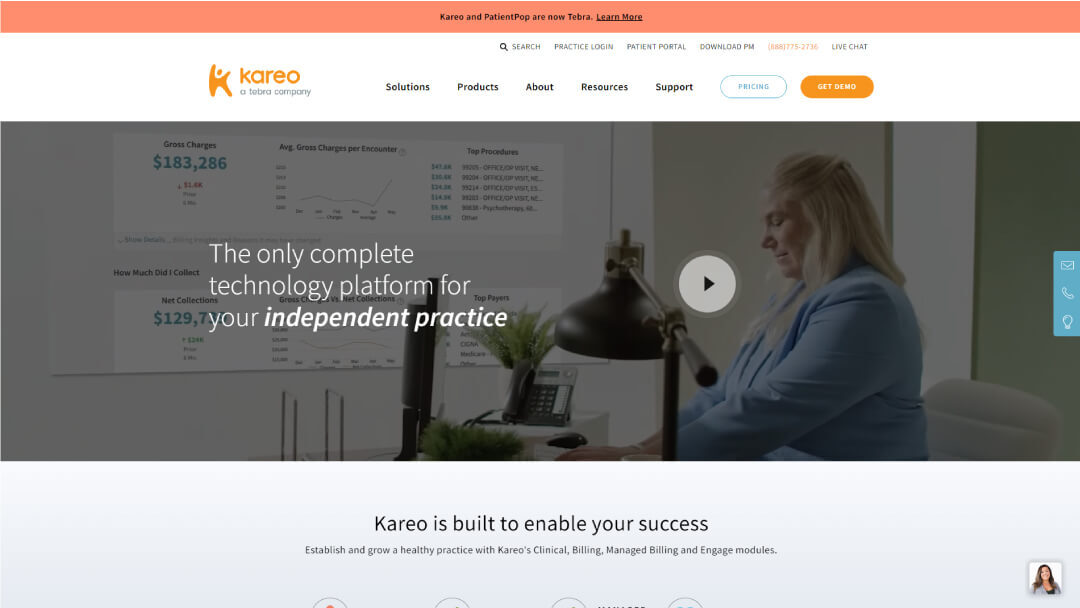
Features
- Revenue cycle management
- Task automation
- Clearinghouse integration
- Patient data security
- Claims scrubbing
Pros
- The user interface is excellent for non-technical people
- Features of the patient or client portal are highly beneficial for the client to register
- Their tutorials are excellent for getting you started
Cons
- They should have more training on the sales team and representatives lack proper knowledge of the product
- There is a latency in reporting problems
Pricing
It is based on individual quotes.
AdvancedMD is a comprehensive and one of the best EHR systems suite designed for mental health, physical therapy, and medical healthcare organizations, as well as independent physician practices.
The software's cloud platform provides the highest levels of data security possible, together with remote access. For Mac and Windows operating systems, It is browser-independent, and the Android and iOS app is accessible for any smartphone.

Features
- Activity dashboard
- Alerts and notifications
- Appointment management
- Appointment scheduling
- Billing & invoicing
Pros
- Easy usage
- The product development team is responsive
- Tech support is pretty good
Cons
- Little slow
Pricing
It is based on individual quotes.
ModMed EHR software gives a one-stop solution of software and services to its clients. This top EHR software allows doctors to do their work. The tasks include clinical, operational, and financial aspects of their duty. When used on a tablet, EHR provides unique touch and swipe gestures for quickly creating patient profiles, diagnoses, treatment plans, and billing.
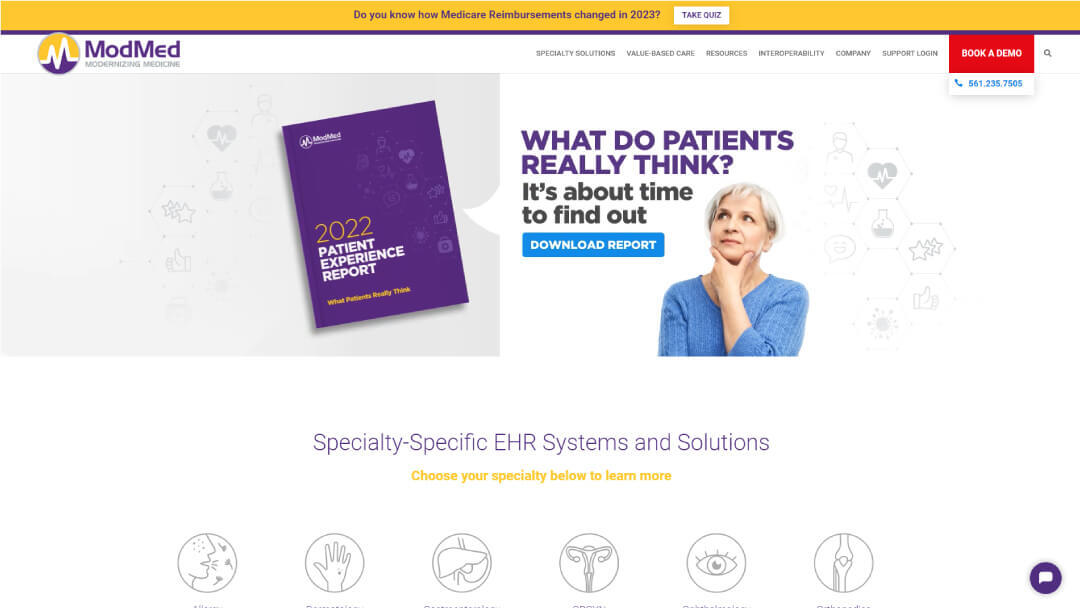
Features
- Clinic interoperability
- Code & charge entry
- Coding assistance
- Communication management
- Compliance management
Pros
- Easy to use
- End-to-end system aids in saving time
- Very responsive customer support
Cons
- The reminder system is not very effective
- Coding errors
Pricing
It is based on individual quotes.
NextGen Healthcare offers award-winning solutions to ambulatory practices of all sizes, as well as dedicated support and professional services. They work with you to achieve success, which leads to healthier patients and happier specialists. It provides your practice with customizable clinical content, user-friendly workflows, and an interconnected patient experience platform that includes telehealth.
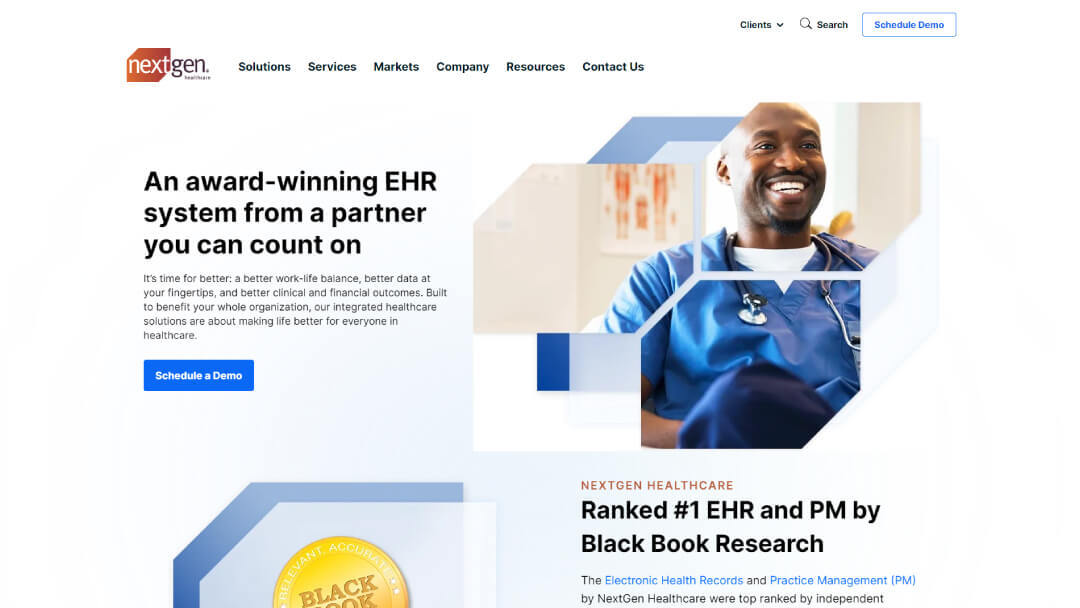
Features
- Rules-based charge creation
- Claims scrubbing and processing
- Supports A/R management
- Collections and reporting
Pros
- Very user-friendly
- Value for money
- Good customer service
Cons
-
Sometimes technical glitches are there
Pricing
It is based on individual quotes.
What are the Challenges In EHR Software?
Besides its many perks, EHR software has its own set of issues that can limit its effectiveness. In this part, we will look at a few of the common issues that healthcare workers confront while using EHR software.
-
Security
The EHR software has many challenges. Among that, strict rules and regulations are a must. This is because they need to protect sensitive information from unauthorized access.
-
Costly
For healthcare providers, implementing EHR software can be a significant financial investment. Apart from the initial cost of purchasing the software, there are ongoing maintenance, training, and support costs that can quickly add up.
-
Not user-friendly
Another issue confronting healthcare providers is the complexity of EHR software. Some EHR systems are extremely difficult to operate and require extensive training and technical expertise. This is especially difficult for small and rural healthcare professionals. There may not be the necessary tools or expertise to manage complex systems.
-
Downtime
EHR systems are not resistant to technical problems that can cause system downtime. This can have severe repercussions for healthcare workers, time disruption in patient care, and possibly jeopardizing patient safety.
-
Time-consuming training
EHR systems can be complicated and need extensive training to use effectively. This can be very time-consuming and detract from the valuable time doctors spend with patients.
Trends Related To Electronic Health Record Software
EHR software has given smooth medical record management. It has become more efficient and accessible. The market for EHR software is constantly developing, with new trends arising. Here we will learn about some of the most recent EHR software trends and their possible effects on the healthcare industry.
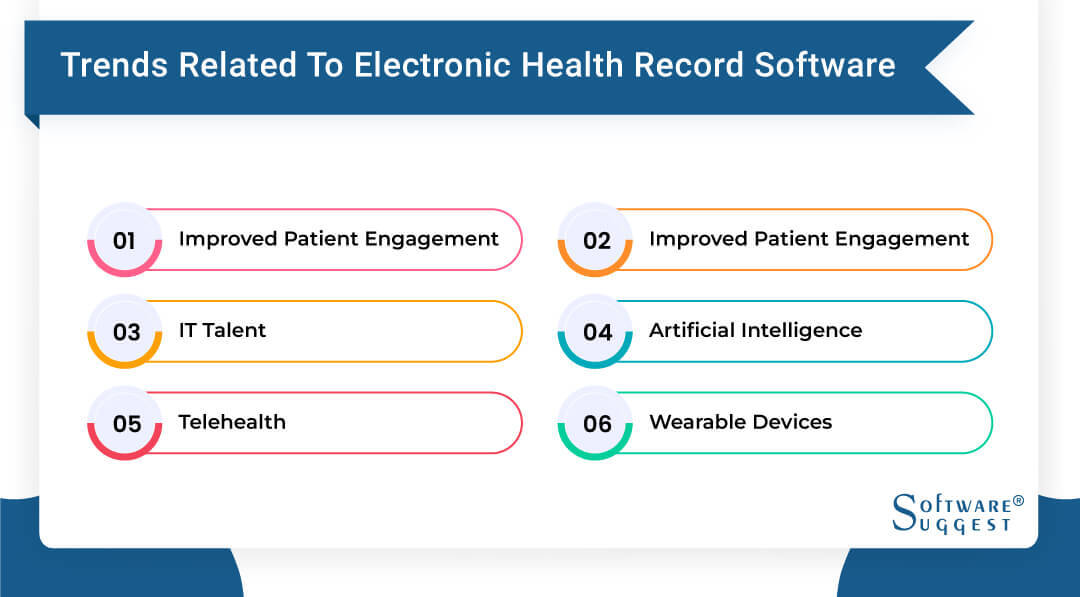
-
Improved patient engagement
One of the most important trends in EHR software is increased patient engagement. Patients can easily use patient portals in order to see their medical records and consult with doctors.
-
Blockchain
This technology, including EHR software, is growing in an increasingly popular manner in healthcare. It may be utilized to secure and smoothen the sharing of medical data among doctors, patients, and other stakeholders.
-
IT Talent
There is a huge market for IT professionals with expertise in EHR software. Hospitals are investing in information technology talent to manage and optimize EHR systems.
The health sector, including EHR software, is predicted to be transformed by artificial intelligence. AI is capable of analyzing huge amounts of medical data, identifying patterns and trends, and offering insight that can improve patient outcomes.
-
Telehealth
This has grown in popularity in recent years, and EHR software can play a vital role in enabling remote healthcare delivery. Be it remote consultations, medical record sharing, and patient monitoring are all possible with EHR systems.
-
Wearable devices
Fitness trackers and smartwatches are going to be more popular in the coming times. To record patient-generated health data, EHR systems can be integrated with such wearable devices.
Software And Services Related To EHR Software
EHR software is a very powerful tool in the medical field. There are plenty of software and services which are related to EHR software. A few of them are:-
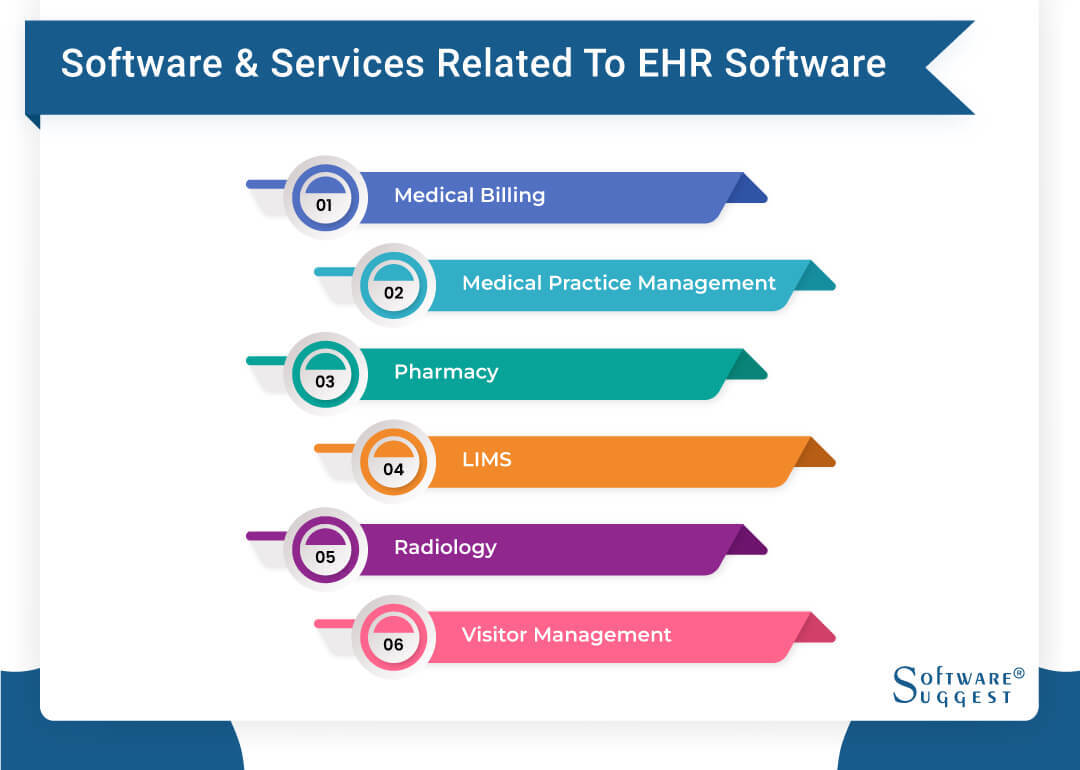
This software helps healthcare providers manage billing and payment processes, including insurance claims, invoicing, and payment tracking.
This software helps manage administrative tasks such as scheduling appointments, patient communication, and staff management. Medical scheduling software helps schedule patient appointments and manage patient flow.
-
Pharmacy
This software helps in preparing prescription orders, dispensing, inventory management, and patient medication history.
This software helps in managing laboratory data, including sample tracking, test results, and quality control.
-
Radiology
This software helps in handling medical imaging data, including storage, retrieval, and sharing.
-
Visitor management
This visitor management software helps in managing visitor registration, tracking, and monitoring in healthcare facilities.
Conclusion
After doing some research on EHR software, we think the best one depends on the specific needs of each healthcare organization. Yet, some top options include Epic, Kareo, and AdvancedMD. It's important to consider factors like ease of use, customization, and security when choosing the right EHR software for your practice.
FAQs
EMR software is utilized to store patient health information within a single medical practice, whereas EHR software can be accessed and shared by multiple healthcare providers and facilities.
Electronic health records EHR software enhances patient care by providing a complete and up-to-date medical history, decreasing medical mistakes, facilitating communication among healthcare providers, and empowering more efficient and coordinated care.
To implement patient medical records software, healthcare providers must first assess their needs, then choose a suitable vendor, prepare and train their staff, customize the software to their needs, test the software, and gradually change to using the software in their practice.
The average cost of Electronic Health Record (EHR) software is $1200.
By Countries















.png)



